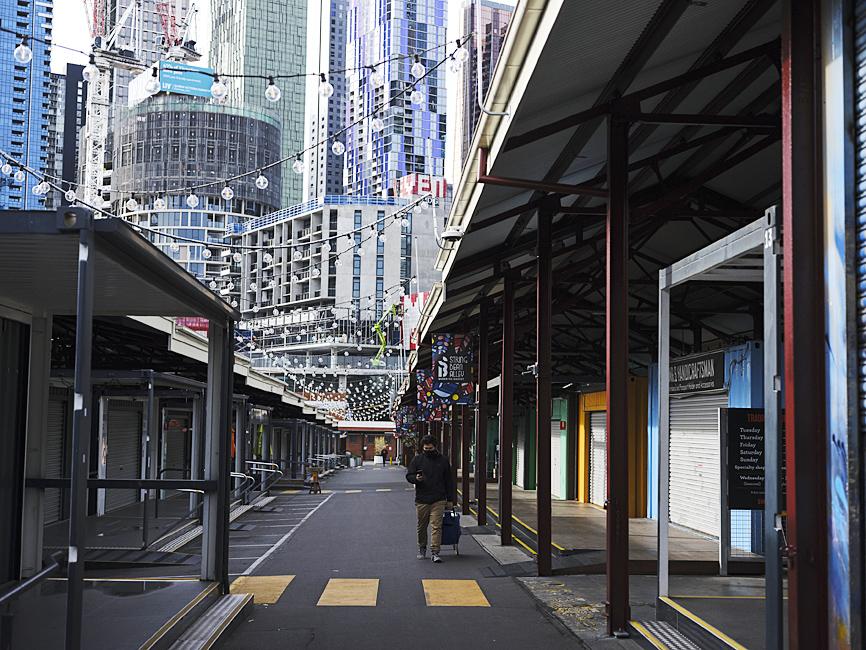Australia is prepared to take the economic hit from China’s trade measures to defend its sovereignty, Australian Minister for Trade, Tourism and Investment Dan Tehan said, even as he pursues efforts to open dialogue with counterparts in Beijing.
“If we have to pay an economic price for that, that’s something that we’re prepared to pay,” Tehan said in an interview in Washington, where he is meeting with US President Joe Biden’s administration to try to work out how to counter China’s actions. “In the end our values are so important to us and we think that they’re something that we have to protect above all else.”
Australia’s ties with China have frayed since 2018, when it barred Huawei Technologies Co (華為) from building its 5G network, and went into freefall last year as Australian Prime Minister Scott Morrison led calls for an independent probe into the origins of COVID-19 in Wuhan, China.

Photo: Bloomberg
Beijing has responded with a volley of punitive trade actions that have hit commodities from coal to barley, lobsters and wine.
“There is collective action we can all take with regards to dealing with economic coercion,” Tehan said of how best to react. “I think we do have to look at whether we can develop other tools to deal with it.”
Bringing attention to Beijing’s action at forums like the WTO ensures there is a “reputational element” for China, he said, adding that whether other tools were needed was part of his discussions with US officials in the past couple of days.
While the US has said it would not leave Australia alone on the field, it has not gone beyond rhetoric so far.
Still, direct communication would be the best way to resolve the issues, Tehan said.
In January, he sent “a long letter” to Chinese Minister of Commerce Wang Wentao (王文濤) setting out “ways in which we could cooperate and the areas we needed to discuss.”
He has yet to receive a response.
The impact of China’s punitive actions has been somewhat blunted — apart from firms and farms directly impacted — by the soaring price of iron ore that Beijing is unable to source in the quantities it needs beyond Australia.
However, prospects of a reconciliation look limited in the near-term.
Asked about Australian agriculture losing market share in China, Chinese Ministry of Foreign Affairs spokesman Zhao Lijian (趙立堅) told a news conference this month: “We will not allow any country to reap benefits from doing business with China while groundlessly accusing and smearing China.”
The US, Australia and other nations this week formally attributed a Microsoft Exchange hack to actors affiliated with the Chinese government and accused Beijing’s leadership of a broad array of “malicious cyber activities.”
Tehan said the response was important because it was not Australia alone, but a group of countries saying that “this activity needs to stop and that there are better ways with which we can engage” with each other.

CHIP WAR: Tariffs on Taiwanese chips would prompt companies to move their factories, but not necessarily to the US, unleashing a ‘global cross-sector tariff war’ US President Donald Trump would “shoot himself in the foot” if he follows through on his recent pledge to impose higher tariffs on Taiwanese and other foreign semiconductors entering the US, analysts said. Trump’s plans to raise tariffs on chips manufactured in Taiwan to as high as 100 percent would backfire, macroeconomist Henry Wu (吳嘉隆) said. He would “shoot himself in the foot,” Wu said on Saturday, as such economic measures would lead Taiwanese chip suppliers to pass on additional costs to their US clients and consumers, and ultimately cause another wave of inflation. Trump has claimed that Taiwan took up to

A start-up in Mexico is trying to help get a handle on one coastal city’s plastic waste problem by converting it into gasoline, diesel and other fuels. With less than 10 percent of the world’s plastics being recycled, Petgas’ idea is that rather than letting discarded plastic become waste, it can become productive again as fuel. Petgas developed a machine in the port city of Boca del Rio that uses pyrolysis, a thermodynamic process that heats plastics in the absence of oxygen, breaking it down to produce gasoline, diesel, kerosene, paraffin and coke. Petgas chief technology officer Carlos Parraguirre Diaz said that in

SUPPORT: The government said it would help firms deal with supply disruptions, after Trump signed orders imposing tariffs of 25 percent on imports from Canada and Mexico The government pledged to help companies with operations in Mexico, such as iPhone assembler Hon Hai Precision Industry Co (鴻海精密), also known as Foxconn Technology Group (富士康科技集團), shift production lines and investment if needed to deal with higher US tariffs. The Ministry of Economic Affairs yesterday announced measures to help local firms cope with the US tariff increases on Canada, Mexico, China and other potential areas. The ministry said that it would establish an investment and trade service center in the US to help Taiwanese firms assess the investment environment in different US states, plan supply chain relocation strategies and

Japan intends to closely monitor the impact on its currency of US President Donald Trump’s new tariffs and is worried about the international fallout from the trade imposts, Japanese Minister of Finance Katsunobu Kato said. “We need to carefully see how the exchange rate and other factors will be affected and what form US monetary policy will take in the future,” Kato said yesterday in an interview with Fuji Television. Japan is very concerned about how the tariffs might impact the global economy, he added. Kato spoke as nations and firms brace for potential repercussions after Trump unleashed the first salvo of